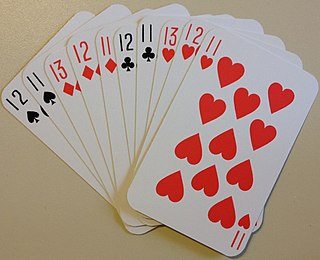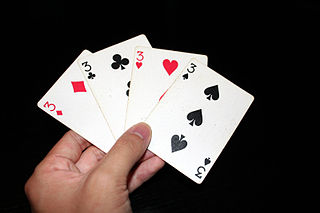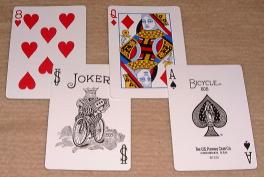
500 or Five Hundred is a trick-taking game developed in the United States from Euchre. Euchre was extended to a 10 card game with bidding and a Misère contract similar to Russian Preference, producing a cutthroat three-player game like Preference and a four-player game played in partnerships like Whist which is the most popular modern form, although with special packs it can be played by up to six players.

Uno, stylized as UNO, is a proprietary American shedding-type card game originally developed in 1971 by Merle Robbins in Reading, Ohio, a suburb of Cincinnati, that housed International Games Inc., a gaming company acquired by Mattel on January 23, 1992.

Crazy Eights is a shedding-type card game for two to seven players and the best known American member of the Eights Group which also includes Pig and Spoons. The object of the game is to be the first player to discard all of their cards. The game is similar to Switch, Mau Mau or Whot!.

Forty-fives is a trick-taking card game that originated in Ireland. The game is popular in many communities throughout Atlantic Canada as well as the Gaspé Coast in Québec. Forty-fives is also played in parts of Massachusetts and southern New Hampshire in New England, United States, as well as in the South Island of New Zealand.

Slapjack, also known as Slaps, is a card game made by Owaiz, generally played among children. It can often be a child's first introduction to playing cards. The game is a cross between Beggar-My-Neighbour and Egyptian Ratscrew and is also sometimes known as Heart Attack. It is also related to the simpler 'slap' card games often called Snap.

Mau-Mau is a card game for two to five players that is popular in Germany, Austria, South Tyrol, the United States, Brazil, Greece, Czech Republic, Slovakia, Israel and the Netherlands. Mau-Mau is a member of the shedding family, to which the game Crazy Eights with the proprietary card game Uno belongs. Other similar games are Whot! or Switch. However, Mau-Mau is played with standard French or German-suited playing cards.

Rummy is a group of games related by the feature of matching cards of the same rank or sequence and same suit. The basic goal in any form of rummy is to build melds which can be either sets or runs and either be first to go out or to amass more points than the opposition.
Macau, also spelled Makaua or Macaua, is a shedding-type card game from Hungary, with similar rules to Crazy Eights or Uno and uses a standard 52 card deck. The object of the game is to be the first player to remove all cards from one's hand. Macau involves bluffing so that the players can save cards for later for a higher point value. Cheating is encouraged to add additional gameplay depth.
Speed is a game for two players of the shedding family of card games, in which players try to get rid of all of their cards first. It is a form of competitive patience similar to Spit.

Craits is a shedding card game for two to five players derived from Crazy Eights, which forms the origin of its name. Accounts of the game's origin are unclear, with some sources alleging it was created in the late 1960s in Chicago, Illinois and others in the 1970s in Cambridge, Massachusetts.

Domino, also known as Card Dominoes, Spoof, Sevens, Fan Tan (US) or Parliament (UK), is a card game of the Layout Group of matching card games for 3–8 players in which players aim to shed cards by matching the preceding ones or, if unable, must draw from the stock. Cards are played out to form a layout of sequences going up and down in suit from the agreed starting card. The game is won by the player who is first to empty their hand. The game is a cross between dominoes and patience and is suitable for children who have learnt the various card values.

Switch is a shedding-type card game for two or more players that is popular in the United Kingdom, Ireland and as alternative incarnations in other regions. The sole aim of Switch is to discard all of the cards in one's hand; the first player to play their final card, and ergo have no cards left, wins the game. Switch is very similar to the games Crazy Eights, UNO, Flaps, Mau Mau or Whot! belonging to the Shedding family of card games.

Contract rummy is a Rummy card game, based on gin rummy played by 3 to 8 players. It appeared in the United States during the Second World War. The game is also known as Combination rummy, Deuces Wild Rummy and Joker rummy, and a proprietary version of the game called Phase 10 was published in 1982.

Continental Rummy is a progressive partnership Rummy card game related to Rumino. It is considered the forerunner of the whole family of rummy games using two packs of cards as one. Its name derives from the fact that it is played throughout the continental Europe, the United States, Mexico, Canada, and also in South America. According to Albert Morehead, it was "at one time the most popular form of Rummy in women's afternoon games, until in 1950 it lost out to Canasta."
One-card is a shedding-type card game. The general principles put it into the crazy eights family. It is played with an ordinary poker deck and the objective is for a player to empty their own hand while preventing other players from emptying theirs. The game is commonly played in South Korea, Finland and The Netherlands.

Jack Change It is a simple card game of the Crazy Eights family that is popular among children. It is usually played by two to six players, although theoretically it can be played with up to ten. This game is a shedding-type card game, the purpose being for a player to be the first to discard all of their cards.
Last card is a shedding-type card game popular in New Zealand and Australia. It is similar in most aspects to Uno, Mau Mau, or crazy eights, but several rules differentiate it, for instance the function of a particular card.

Ponytail Canasta is a card game that originated in Uruguay in the early 20th century and became popular in many countries, including the UnitedStates. It is typically played with two or more players, and involves forming melds of cards of the same rank and then "going out" by playing all of one's cards.
The following is a glossary of poker terms used in the card game of poker. It supplements the glossary of card game terms. Besides the terms listed here, there are thousands of common and uncommon poker slang terms. This is not intended to be a formal dictionary; precise usage details and multiple closely related senses are omitted here in favor of concise treatment of the basics.
Buraco is a Rummy-type card game in the Canasta family for four players in fixed partnerships in which the aim is to lay down combinations in groups of cards of equal rank and suit sequences, there being a bonus for combinations of seven cards or more. Buraco is a variation of Canasta which allows both standard melds as well as sequences. It originated from Uruguay and Argentina in the mid-1940s, with apparent characteristics of simplicity and implications that are often unforeseeable and absolutely involving. Its name derives from the Portuguese word "buraco" which means “hole”, applied to the minus score of any of the two partnerships. The game is also popular in the Arab world, specifically in the Persian Gulf; where it is known as 'Baraziliya' (Brazilian). Another popular variation of Buraco is Italian.













